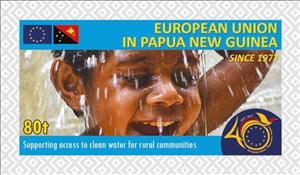Stamp: Supporting access to clean water for rural communities (Papua New Guinea 2018)
Supporting access to clean water for rural communities (Papua New Guinea 2018)
14 May (Papua New Guinea ) within release 40th Anniv. of Papua New Guinea-European Union Partnership goes into circulation Stamp Supporting access to clean water for rural communities face value 80 Papua New Guinean toea
| Stamp Supporting access to clean water for rural communities in catalogues | |
|---|---|
| Colnect codes: | Col: PG 2018-06A |
Stamp is horizontal format.
Also in the issue 40th Anniv. of Papua New Guinea-European Union Partnership:
- Mini Sheet - European Union in Papua New Guinea (1) face value 12.65;
- Stamp - Supporting the National WaSH policy face value 3.45;
- Stamp - Support to promoting sustainable fisheries face value 1.60;
- Stamp - Supporting the National WaSH policy face value 6.90;
- Stamp - Supporting access to clean water for rural communities face value 80;
Stamp Supporting access to clean water for rural communities it reflects the thematic directions:
An anniversary is the date on which an event took place or an institution was founded in a previous year, and may also refer to the commemoration or celebration of that event. For example, the first event is the initial occurrence or, if planned, the inaugural of the event. One year later would be the first anniversary of that event. The word was first used for Catholic feasts to commemorate saints. Most countries celebrate national anniversaries, typically called national days. These could be the date of independence of the nation or the adoption of a new constitution or form of government. The important dates in a sitting monarch's reign may also be commemorated, an event often referred to as a "Jubilee".
Biologically, a child (plural: children) is a human being between the stages of birth and puberty. The legal definition of child generally refers to a minor, otherwise known as a person younger than the age of majority. Child may also describe a relationship with a parent (such as sons and daughters of any age) or, metaphorically, an authority figure, or signify group membership in a clan, tribe, or religion; it can also signify being strongly affected by a specific time, place, or circumstance, as in "a child of nature" or "a child of the Sixties". There are many social issues that affect children, such as childhood education, bullying, child poverty, dysfunctional families, child labor, hunger, and child homelessness. Children can be raised by parents, by fosterers, guardians or partially raised in a day care center.
Diplomacy is the main instrument of foreign policy which represents the broader goals and strategies that guide a state's interactions with the rest of the world. International treaties, agreements, alliances, and other manifestations of international relations are usually the result of diplomatic negotiation and processes. Diplomats may also help shape a state by advising government officials.
A flag is a piece of fabric (most often rectangular or quadrilateral) with a distinctive design that is used as a symbol, as a signaling device, or as decoration. The term flag is also used to refer to the graphic design employed, and flags have since evolved into a general tool for rudimentary signalling and identification, especially in environments where communication is similarly challenging (such as the maritime environment where semaphore is used). National flags are patriotic symbols with varied wide-ranging interpretations, often including strong military associations due to their original and ongoing military uses. Flags are also used in messaging, advertising, or for other decorative purposes. The study of flags is known as vexillology, from the Latin word vexillum, meaning flag or banner.




